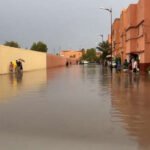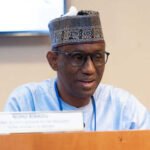The Civil Society Advocacy Legislative Centre (CISLAC) has raised concerns over the decline in freedom of expression and respect for human rights in Nigeria.
CISLAC raised the concerns on the back of Nigeria’s poor rating in the 2021 Corruption Perception Index (CPI) by Transparency International (TI).
The latest CPI index, which aggregated data from eight sources, showed that the country scored 24 out of 100 points, dropping one point compared to the 2020 report.
Africa’s most populous country now ranks 154 out of 180 countries, five places down compared to the previous report.
According to CISLAC, the suspension of Twitter in the country for seven months contributed to the country’s poor CPI rating.
The Nigerian government suspended the social media firm after the tech company deleted a tweet from the official account of President Muhammadu Buhari.
The government accused Twitter of allowing its platform to be used ‘for activities that are capable of undermining Nigeria’s corporate existence’.
‘We have a country to rule, and we will do so to the best of our ability. Twitter’s mission in Nigeria is very suspect, they have an agenda. The mission of Twitter in Nigeria is very suspicious’, the country’s Minister of Information, Lai Muhammed, said in a statement in June 2021.
Also, Nigeria’s press freedom has not improved as the World Press Freedom Index for 2021 by Reporters Without Borders (RWB) shows that the country is ‘one of West Africa’s most dangerous and difficult countries for journalists’.
CISLAC, in its analysis of the latest CPI, said that the government must ensure a democratic and free civic space for engagement with the citizenry and the media to aid its fight against corruption.
‘The intimidation of human rights defenders stands to be strongly condemned. We hold that corruption enables human rights abuses and corruption thrives when human rights defenders are silenced’, the Executive Director of CISLAC, Auwal Musa, said.
‘Hence, the Nigerian government must retrace its step from this dangerous decline and infringement on the fundamental human rights of citizens as enshrined by the constitution’.
CISLAC listed six other key weaknesses – damning audit report; security sector corruption; failure to investigate high profile corruption cases and prevent illicit financial flows; absence of asset recovery, protection of whistle-blowers, and other key anti-corruption legal farmeworks; judicial challenges; and corruption in the Covid-19 response – to explain why Nigeria may not have improved in the fight against corruption.
For instance, despite the launch of the whistle-blowing policy in December 2016, which immediately led to the federal government recovering over $178 million in two months, the protection of whistle-blowers has been a major challenge in the fight against corruption in the country.
In line with this, CISLAC called on federal lawmakers to speed up deliberations and passage of relevant anti-corruption related laws or amendments to strengthen anti-corruption efforts.
The organisation also called on the Nigeria Police Force to investigate the systematic corruption in the force.
CISLAC also called on anti-graft agencies to investigate allegations of corruption by ‘politically exposed persons’ irrespective of political party affiliation.
Source: CISLAC
Photo source: CSIS




